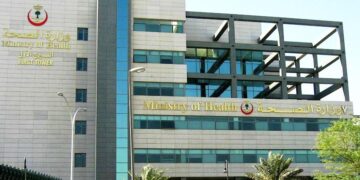The global logistics and air cargo sectors are expanding rapidly, but this growth brings environmental concerns to the forefront. Recognizing the urgency for sustainable practices, Saudi Arabia has pledged to revolutionize its air cargo sector in alignment with its ambitious Vision 2030 plan. The nation’s strategy entails leveraging state-of-the-art technologies, investing in eco-friendly infrastructure, and cultivating strategic alliances to diminish its carbon footprint and foster environmental conservation.
The imperative of sustainability in air cargo
Aviation is responsible for around 2.5% of worldwide CO2 emissions, and when factoring in non-CO2 effects like contrails, the industry’s total impact on climate change is closer to 4%. Consequently, air cargo is a major contributor to global warming and climate change due to greenhouse gases (GHGs).
The predominant environmental concern stems from CO2 emissions resulting from jet fuel combustion. Despite progress in fuel efficiency and aircraft technology, the sector’s swift expansion has led to increased emissions. New aircraft models and enhanced flight operations contribute to reduced fuel consumption and lower emissions.
Emissions from aircraft include water vapor, nitrogen oxides, and particulate matter, which are implicated in contrail and ozone formation. These emissions have intricate atmospheric interactions, often exacerbating warming effects.
Transporting electronic waste (e-waste) and hazardous materials also poses substantial environmental risks. Proper management and disposal are essential to prevent these substances from harming ecosystems.
The international community is focusing more on mitigating the aviation industry’s environmental impact. Agreements like the Paris Agreement aim to curb global warming, pushing industries, including air cargo, to embrace sustainable measures. Regulators are enforcing stricter emission standards and promoting the use of sustainable aviation fuels (SAFs) and other green technologies.
Key green initiatives in Saudi Arabia’s air cargo sector
Aligned with Vision 2030, Saudi Arabia has introduced numerous initiatives to encourage sustainability in its air cargo sector. These measures emphasize the integration of advanced technologies, establishment of strategic partnerships, and investment in sustainable infrastructure to lessen the environmental impact of air cargo activities.
SAFs, derived from renewable resources like waste materials and algae, are fundamental to Saudi Arabia’s strategy to curb carbon emissions from air cargo. The Kingdom is actively venturing into and financing the production of SAFs to transition its air cargo fleet to these cleaner alternatives. Partnerships with leading fuel producers and government support are vital for expediting the uptake of SAFs in the region.
Saudi Arabia is also adopting various eco-friendly practices to boost the sustainability of its logistics operations. Airports and logistics centers are being upgraded with energy-efficient systems, including LED lighting, advanced HVAC systems, and solar panels. Utilizing automated guided vehicles (AGVs) and digital dashboards aids in streamlining operations, decreasing energy use, and enhancing efficiency. The shift to electric vehicles for ground operations further cuts emissions and promotes a green logistics framework.
Considerable investments are being made to modernize Saudi Arabia’s airport infrastructure to back sustainable air cargo operations. New cargo facilities with the latest technology are being built to heighten operational efficiency and lessen environmental impact. These facilities adhere to sustainable design principles to minimize energy consumption and emissions. The development of major global long-haul connecting hubs in Riyadh and Jeddah aims to optimize cargo procedures and cut transit times, which helps in reducing emissions.
In addition, Saudi Arabia is forging strategic partnerships with global green technology leaders to advance sustainability in the air cargo industry. The collaboration between DSV and Saudi Arabia’s NEOM project seeks to transform the logistics sector with sustainable methods. This initiative concentrates on developing innovative technologies and sustainable logistics solutions, aiding in the fulfillment of the Kingdom’s Vision 2030 goals. Collaborations with international entities like the International Air Transport Association (IATA) and the International Civil Aviation Organization (ICAO) ensure that Saudi Arabia’s eco-friendly endeavors are in line with global standards and best practices.
Challenges and opportunities
While Saudi Arabia is committed to boosting the sustainability of its air cargo sector, it faces various challenges and opportunities that are critical for understanding the dynamics of the industry and its future growth prospects.
Implementing sustainable technologies, such as SAFs and electric ground vehicles, necessitates significant outlays and technological progress. The initial costs and the need for extensive R&D can present considerable challenges. Additionally, retrofitting existing infrastructure to support new technologies and sustainability norms is an intricate and expensive process. Airports and logistics hubs need to be retrofitted with energy-efficient systems, which involves major alterations and investments.
Developing a comprehensive regulatory framework that supports sustainability goals while maintaining operational effectiveness is another hurdle. New regulations that accommodate innovative technologies and practices can impede progress. Furthermore, establishing compliance with international sustainability standards while adapting them to local contexts demands coordination among diverse stakeholders, including government entities, private firms, and international organizations.
The substantial costs linked with sustainable initiatives can also deter participation, particularly for smaller operators. Securing funding and investment for large-scale projects, such as the $100 billion proposed in Saudi Arabia’s aviation strategy, is essential but challenging. Harmonizing economic growth with environmental sustainability necessitates thoughtful planning and strategic expenditure. It is important to ensure that eco-friendly initiatives do not adversely affect the economic viability of the air cargo industry.
Despite these obstacles, Saudi Arabia’s air cargo sector also presents opportunities for expansion and innovation.
The Kingdom’s strategic location at the intersection of Europe, Asia, and Africa makes it a critical hub for global trade. Advancing air cargo capabilities through sustainable practices can greatly enhance Saudi Arabia’s role in international logistics. The establishment of significant infrastructure projects, including new airports and logistics hubs, offers chances to incorporate sustainable practices from the outset, ensuring long-term environmental advantages.
Investment in leading-edge technologies, such as SAFs, electric ground vehicles, and advanced logistics systems, can drive innovation in the air cargo industry. These advancements not only mitigate environmental impact but also improve operational efficiency and reliability. Partnerships with global sustainability and technology leaders can hasten the adoption of groundbreaking solutions.
Moreover, sustainable initiatives in the air cargo sector contribute to the broader objectives of Vision 2030, fostering economic diversification and reducing dependence on oil revenues. The logistics sector’s growth generates numerous job opportunities, bolsters local economies, and enhances workforce skills.
Future outlook
The prospect for Saudi Arabia’s air cargo sector under Vision 2030 appears exceptionally bright, guided by strategic initiatives, technological breakthroughs, and major investments to position the Kingdom as a preeminent global logistics center.
The National Aviation Strategy, a key component of Vision 2030, aspires to transform the Kingdom into a premiere global aviation hub. The strategy includes a $100 billion investment to expand connectivity to over 250 destinations via 29 airports, triple annual passenger traffic to 330 million, and elevate air cargo volume to 4.5 million tons. Major infrastructure initiatives comprise the construction of a new international airport in Riyadh and the expansion of existing airports in Jeddah and other strategic locales.
The introduction of cutting-edge technologies such as unmanned aircraft systems and vertical take-off and landing (VTOL) aircraft is anticipated to revolutionize the air cargo industry, amplifying operational efficiency and sustainability. Investment in SAFs and green logistics solutions are central to minimizing the sector’s environmental footprint. These initiatives are in harmony with worldwide endeavors to render aviation more sustainable and support Saudi Arabia’s ambition to achieve net-zero carbon emissions by 2060.
The air cargo sector’s expansion is vital for Saudi Arabia’s broader economic diversification aims under Vision 2030. The industry underpins economic resilience and growth by promoting non-oil exports and enhancing global trade connectivity. The development of logistics hubs and special economic zones, such as NEOM, is expected to attract notable international investment, spur innovation, and create thousands of jobs, thereby boosting local economies.
Furthermore, the infrastructure projects and technological advancements in the air cargo domain are projected to generate substantial job opportunities across a variety of roles, from ground handling and logistics operations to high-tech positions in digital logistics management. Initiatives like the Shareek programme, which seeks to amplify domestic investment by private sector entities, will further support job creation and economic diversification.
With its strategic position at the nexus of three continents—Asia, Europe, and Africa—Saudi Arabia capitalizes on its geographical edge to bolster its air cargo capabilities and establish itself as a central hub for international trade. The creation of two key global long-haul connecting hubs in Riyadh and Jeddah is planned to streamline cargo operations and facilitate efficient goods movement, solidifying Saudi Arabia’s place in the global logistics network.
Collaborations with global logistics leaders and technology innovators are instrumental for advancing Saudi Arabia’s air cargo industry. These partnerships promote the adoption of novel technologies, boost operational efficiencies, and endorse sustainable methods. The Future Aviation Forum and other international events hosted by Saudi Arabia offer platforms for global aviation leaders to explore challenges









